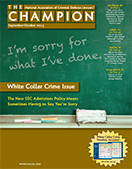September/October 2015

What are the challenges a defendant faces in a tax case when the government pursues simultaneous civil and criminal penalties?
Articles in this Issue
-
Affiliate News
Affiliate News for September/October 2015 Champion.
-
Attorney-Client Privilege In Internal Investigations: Best Practices and Lessons From Recent Cases
Many things are uncertain at the beginning of an internal investigation, and a company should ensure that the investigation and its conclusions will be protected by the attorney-client privilege, at least until the company makes a considered decision to waive the privilege. Anne Chapman and Kathleen Brody discuss some of the considerations touching the attorney-client privilege in internal investigations. Taking lessons from recent high-profile litigation, they provide tips for best practices.
-
Book Review: How to Navigate Through Federal Prison and Gain An Early Release
With a desire to help those who are sentenced to serve time in a federal prison, Lisa Barrett has written a detailed guide to surviving and thriving while incarcerated. In a book that is the first of its kind, written from a prisoner’s perspective, Barrett prepares inmates for what they will face.
-
Book Review: The Death Penalty - What’s Keeping It Alive
Andrea Lyon, Dean of Valparaiso University Law School in Indiana, once again brings her prodigious experience and knowledge to one of the most vexing and polarizing issues in our society, the death penalty, posing the question in her latest book: “What’s keeping it alive?”
-
Comprehensive Tax Enforcement: Civil and Criminal Tools
The tax code provides the government with tools that include criminal sanctions, civil penalties, and injunctive relief. Sometimes the government chooses one track at a time, but in some cases a defendant may face parallel proceedings involving an array of civil and criminal penalties. Kathryn Keneally discusses the challenges both prosecution and defense encounter when the government pursues simultaneous civil and criminal enforcement.
-
From the President: Pretrial Incarceration — Punishment or Regulatory? Ask Alice.
E.G. Morris discusses the current state of the bail system. He believes that pretrial release conditions requiring financial conditions must be used as a last resort. An accused should be released on personal recognizance unless an evidence-based determination is made that the individual presents a flight risk or imminent physical harm to others.
-
Inside NACDL: Overcriminalization: It Can Be Complex or Simple, But It Is Always Wrong
In September 2015, NACDL sponsored a briefing for congressional staffers that addressed two questions: How should the federal government strike the right balance between the use of criminal law sanctions and civil law sanctions? Are prosecutors expanding the reach of criminal statutes to address conduct that was clearly not contemplated by Congress when enacted?
-
NACDL News: Advocates Urge Government to ‘Strike the Right Balance’
On Sept. 16, 2015, NACDL Executive Director Norman Reimer introduced a panel titled “Striking the Right Balance: Criminal v. Civil Sanctions” on Capitol Hill.
-
NACDL News: DOJ Files Amicus Brief in Indigent ‘Right to Counsel’ Case Before PA Supreme Court
The U.S. Department of Justice (DOJ) filed an amicus curiae, or friend-of-the-court, brief on September 10 in a putative class action suit currently before the Supreme Court of Pennsylvania concerning the inadequate funding of the Luzerne County public defender’s office.
-
NACDL News: NACDL Issues Major Report, Calls for Greater Independence for Federal Indigent Defense S
A major new report — Federal Indigent Defense 2015: The Independence Imperative — broadly examines the federal indigent defense system, covering the entire manner in which the system operates.
-
NACDL News: NACDL Releases Defense Attorney Guide to Adult Pretrial Release in Colorado
September 21 saw the release of Colorado Bail Book: A Defense Attorney’s Guide to Adult Pretrial Release.
-
The Newman Decision And Its Ramifications
The government’s almost 100 percent success rate in insider trading prosecutions has come crashing up against the Second Circuit’s focus on remote tippee liability in United States v. Newman. If the U.S. Supreme Court agrees to hear Newman, the government’s cause may be helped by United States v. Salman, a Ninth Circuit decision that appears to disagree with Newman.
-
The Rule of Lenity Redivivus: New Interest In an Old Doctrine
Since the turn of the century, the rule of lenity has enjoyed a mini-revival, at least when interpreting a law broadly would expose a defendant to a lengthy sentence disproportionate to the offense. The latest illustration of this trend is Yates v. United States. When punishment would be incommensurate with the offense, defense attorneys should not forget that an argument based on the rule of lenity can have considerable force.
-
The SEC’s New Admissions Policy Means Sometimes Having to Say You’re Sorry
While it still uses its “no admit, no deny” policy in most cases, now in certain circumstances the Securities and Exchange Commission will require defendants to admit wrongdoing in order to settle their cases. Has the new policy made a significant impact? What may be the real danger in this new policy?
-
White Collar Crime Policy: Legislative Update: There's Hope on the Horizon
For most people, the One Hundred and Fourteenth United States Congress (January 2015-January 2017) has not been an exemplar of political cooperation. Despite the perception of the public, however, an almost unprecedented number of criminal justice reform bills are pending.
